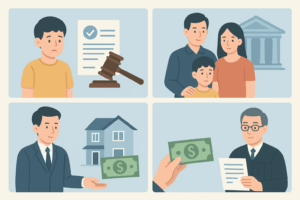Introduction
Thailand’s labour law govern a complex web of relationships between employers and employees, regulating everything from contracts and wages to termination and legal rights. Understanding this law is vital for anyone involved in the Thai workforce, whether as an employer, an employee, or a business owner planning to venture into this bustling economy. This comprehensive guide will delve into 10 of the most frequently asked questions about Thai labour law, exploring them in great detail.
Understanding the Thai Labour Landscape
Before diving into the specific questions, it’s essential to grasp the overall landscape of labor law in Thailand. Rooted in principles that seek to balance the rights and duties of both parties, Thai labour law reflects a blend of traditional values and modern legal principles. It is designed to foster a fair and productive working environment.
Frequently Asked Questions
1. Can the employer terminate employment without cause?
Answer
Under Thai labour law, terminating an employee without a valid cause is strictly prohibited. Employers must adhere to specific grounds for termination outlined in the laws, such as misconduct, poor performance, or redundancy.
Further Explanation
This rule emphasizes the importance of fair treatment and due process. If an employer wishes to terminate an employee, they must follow proper procedures, including providing notice, specifying the reason, and, in some cases, offering severance pay. This is designed to protect employees from arbitrary or unjust dismissal and to encourage responsible management practices. Legal guidance may be sought if there’s ambiguity in the grounds for termination.
2. How many days of business leave can employees request per year, and will they receive wages on business leave?
Answer
Thai labour law does not expressly stipulate the number of days for business leave or the payment of wages during this leave. The right to take leave for necessary business and the associated conditions must be detailed in the employer’s regulations.
Further Explanation
This flexibility allows individual companies to establish policies that suit their unique operational needs. However, it also places a responsibility on employers to craft clear and fair policies, and on employees to understand those policies. Both parties should maintain open communication and adhere to the mutually agreed terms.
3. If an employee has only worked for 15 days and then resigns, will they receive wages?
Answer
Yes, employees will be paid for the actual work performed, even if they resign after only 15 days.
Further Explanation
This rule reflects the principle that wages are earned for work performed, regardless of the duration of employment. It encourages fair compensation practices and ensures that employees are paid for their labor.
4. Can an employee take sick leave without a medical certificate?
Answer
Yes, if the sick leave is for less than three consecutive days. However, the employer may request a medical certificate if there is doubt about the validity of the sick leave.
Further Explanation
This provision balances the employees’ right to sick leave with the employers’ need to ensure that this right is not abused. Employees are entitled to take short sick leaves without extensive documentation, but they must also act responsibly and in good faith. This allows for flexibility while still enabling employers to maintain accountability.
5. Can the company not pay wages on sick days?
Answer
No, employees are entitled to 30 days of paid sick leave per year. Beyond this, employees are not entitled to wages for sick leave.
Further Explanation
The provision for paid sick leave demonstrates a social welfare perspective embedded in Thai labour law. It acknowledges that employees may fall ill and should not be financially penalized for circumstances beyond their control. However, the limitation to 30 days also ensures that the system is not exploited.
6. Is ordering work outside of working hours a violation of privacy rights?
Answer
No, this is not considered a violation of privacy rights, but the employee has the right to accept or reject the request.
Further Explanation
This aspect of Thai labour law illustrates a balance between an employer’s operational needs and an employee’s personal rights. While employers may request additional work, employees have the autonomy to make decisions that align with their personal life and well-being.
7. Can an employee claim compensation if they do not pass probation?
Answer
If the employee has not completed 120 days of work, they have no right to receive severance pay.
Further Explanation
The probationary period allows employers to assess an employee’s suitability for a position. This rule acknowledges the unique nature of probation, emphasizing the provisional and evaluative aspect of this period. Both parties should have clear expectations and communication during this time.
8. Can an employee resign without prior notice?
Answer
The law stipulates that if an employee resigns, at least one pay period notice must be given in advance. The resignation is effective immediately, even if the employer does not approve.
Further Explanation
This regulation ensures that both parties have adequate time to adjust to the change in the employment relationship. It fosters responsible behavior and allows for a smoother transition for both the employer and the employee.
9. If the employer refuses work, confiscates equipment, and does not pay wages, is it considered termination of employment?
Answer
Yes, these actions are considered a termination of employment.
Further Explanation
This provision underscores the importance of constructive relationships between employers and employees. By recognizing actions that effectively end the employment relationship, even if not formally terminated, the law seeks to prevent unfair treatment and to provide legal recourse for employees.
10. Can the company hire a child employee?
Answer
Employers are prohibited from employing children under 15 years of age. Employing children under 18 requires compliance with specific regulations.
Further Explanation
This regulation reflects a strong commitment to child welfare and education. By setting clear age boundaries and associated conditions, Thai labour law protects the rights and well-being of children, aligning with international standards on child labor.
Conclusion
Understanding Thai labour law is crucial for anyone involved in the workforce or business landscape in Thailand. The law’s complexity, nuances, and unique characteristics reflect a multifaceted system that seeks to foster fairness, responsibility, and social welfare. Whether you are an employee curious about your rights, an employer aiming to comply with legal requirements, or a business owner planning to venture into Thailand, this comprehensive guide provides a strong foundation.
For further assistance or specialized legal advice, it’s always advisable to consult with a Thai law firm or legal expert specializing in labor law. Their expertise can guide you through the complexities of the system and help you navigate the specific challenges and opportunities that may arise in your unique situation.
By engaging with Thai labour law in an informed and responsible manner, you contribute to a thriving and fair working environment that benefits all parties involved. It’s a journey that requires continuous learning, open communication, and a commitment to the principles that underpin the law.
Contact : Siam Center Law Group by calling +66(0) 2 648 5041, +66(0) 2 648 5042





